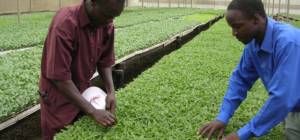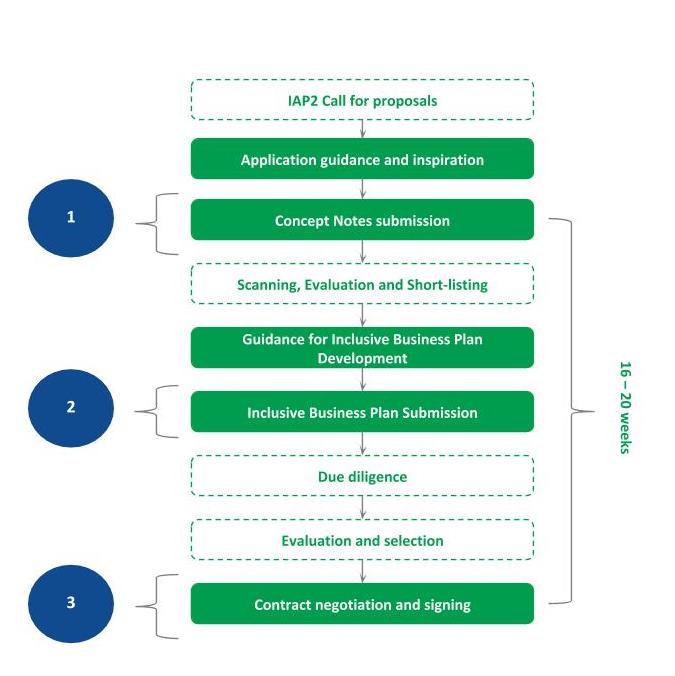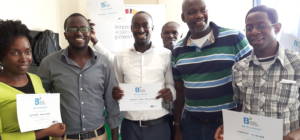
With the Innovations Against Poverty Fund in full swing, IBA checked in with two of IAP’s global evaluators, Geertje Otten from SNV and Mike Debelak from ..

Innovations Against Poverty challenges the private sector to develop products, services and business models that can contribute to the fight against poverty and climate change.
Through our advisory and non-reimbursable funding, we support innovative Inclusive Business models that deliver developmental benefits for the low income population in both rural and urban areas, while being commercially viable.
The program is designed for companies which are operational or plan to enter the market (with a local partner in case of foreign companies) in the following sectors:

And the following countries:

An innovative inclusive business to be supported by IAP should be characterized by the following parameters:

IAP provides advisory support and non-reimbursable funding for up to 49% of the total investment to selected projects through competitive open calls for proposals.

Private sector development has proven to be a real catalyst of change when it comes to creating the opportunity for low income people to lift themselves out of poverty. Additionally, low income markets represent a large business opportunity: the four billion people living on less than $8 USD a day constitute a global consumer market with a shared purchasing power valued at 5 trillion USD. The low income population provides the potential to increase labour, supplier and distribution channels that can support expanded production and market supply. This offers significant scope for entrepreneurship and private sector development to make a positive impact on low income people’s quality of life.
By thinking innovatively, companies can develop business ideas that solve social and environmental issues while at the same time maximizing their competitiveness and profitability. However, many of these initiatives are exposed to commercial, technical and financial risks, and have limited access to markets. Most companies initiating an innovative Inclusive Business idea traditionally lack the technical support required and are too large for micro-finance, and too small and risky for mainstream commercial debt and venture capital, making them part of the so-called “Missing Middle” gap.
In this context, the Swedish International Development Cooperation Agency (Sida) launched the Innovations Against Poverty Fund (IAP) to stimulate private sector development initiatives which otherwise would not have taken place. The IAP fund functions as a risk sharing mechanism, with the specific mandate to identify and support innovative Inclusive Business models that deliver both commercial benefits for the private sector and developmental benefits -such as the creation of jobs, income increase and access to basic goods and services- for low income people, prioritizing women and youth.
The IAP fund was initially launched in 2011, taking on a pioneering role in promoting innovations and social entrepreneurship aimed at the low income population. During the pilot phase from 2011 until 2016, 66 projects have received funding, 34 large grants and 32 small grants, and a total of €5,4m has been invested in various sectors across 30 developing countries in the world. Click here for further information on IAP phase 1 projects: http://www.inclusivebusinesshub.org/all-innovation-against-poverty/
Following the success of the pilot phase, Sida launched the second phase of the IAP fund in 2016, managed by SNV Netherlands Development Organisation in partnership with Inclusive Business Sweden (IB Sweden) and BoP Innovation Center (BoP Inc.). The second phase is designed for innovative inclusive business ventures in Cambodia, Ethiopia, Uganda and Zambia active in one of the following sectors:
| Agriculture and food: including, but not limited to, achieve food security and improved nutrition; promote sustainable agriculture. | |
| WASH: including, but not limited to, availability and sustainable management of water and sanitation for all. | |
| Energy: including, but not limited to, access to affordable, reliable, sustainable and modern energy for all. | |
| ICT: including, but not limited to, access to technologies and services that help deliver solutions in the sectors above or other basic needs. |
Applications should be contributing to the realization of one or more of the Sustainable Development Goals (SDGs).
IAP will provide a mix of advisory and funding to selected innovative Inclusive Business cases as a result of competitive open calls. The support provided by IAP is defined as follows:
Financial support
IAP will provide non-reimbursable funding ranging from €50 000 up to €200 000 not exceeding a maximum of 49% of the total required investment to implement the innovative Inclusive Business idea.
Advisory support
The advisory support offered by IAP will be provided through trainings and coaching, covering areas such as Inclusive Business development and innovation, to enhance and efficiently achieve the targets of each Inclusive Business initiative. In addition IAP will select and train a number of local consultants that will be available to support the businesses on a fee for services basis.
IAP secures a transparent evaluation and selection process by working with a multi-player independent appraisal process, so that no single person can influence the process and/or the final outcome in any way. Applicants can contact directly the IAP Executive Manager at [email protected] or Sida at [email protected] to denounce any corruption practice or case.
The IAP application process is organized around two phases: the submission of a concept note and if shortlisted the submission of a full business plan. Each concept note will be reviewed to ensure that it complies with the minimum eligibility criteria and will then be evaluated against the basic assessment criteria, including: project viability, social impact, innovation, the responsible business approach, and sustainability and scale-up potential. Shortlisted candidates will subsequently be invited to submit a full business plan, which will be evaluated against the full list of assessment criteria, which includes in addition to the basic assessment criteria: additionality, cost effectiveness and other risk factors.
The application process consists of the following steps:

It is important to note that the selection process is implemented on a first come, first serve basis.
Before filling out the application form, make sure to read carefully the guidelines that explain in detail the all the aspects of the application process and the selection criteria.
In case you have additional queries which are not covered in the guidelines, please refer to the Frequently Asked Questions. If your question remains unanswered feel free to contact us.
IAP is organizing launch events for each of the four countries that is hosting a call for applications:
If you are interested in participating, please contact us at: [email protected]
Download the IAP leaflet here.
Download the overall guidelines here.
Download the Terms and Conditions here.
Download the application form in Word format here. NOTE: only applications submitted online will be considered, this file is for preparation purposes only.
Do you want to scale your business in low-income markets? Do you want to improve your competencies in practical and applicable way? Are you looking for the latest insight on company practices in low-income markets?
The inclusive Business Academy provides online executive courses on inclusive business related topics. The courses are presented by leading experts from the business world and academia. Find an overview of open and upcoming bootcamps at: https://iba.ventures/academy/
IAP and IBA are continuously training advisors and consultants to expand the pool of quality business experts. If you require advisory support, you can find a large pool of specialists on our advisory marketplace: https://iba.ventures/advisory/.
Mr. Javier Ayala, IAP Multi Country Fund – Executive Manager
[email protected]
+855 23 994 562
Premier Office Centre, 2nd floor, #184, Street 217 (Monireth), Phnom Penh, Cambodia
Ms. Charya Khim
[email protected]
+855 23 994 562
Premier Office Centre. 2nd floor, #184, Street 217 (Monireth), Phnom Penh
Ms. Eldad Girma
[email protected]
+251 111 262 100
Tracon Tower, 6th floor, Churchill Avenue Churchill Road, Opp. Tikur Anbessa High School, Arada Sub City, Kebele 01/02, Addis Ababa
Mr. Moses Komagum
[email protected]
+256 414 563 218
Plot 36 Luthuli Rise Bugolobi, Kampala
Mr. Alinani Simukonda
[email protected]
+260 211 255 174
7 Nkanchibaya road, Rhodespark, Lusaka
Ms. Geertje Otten
[email protected]
+ 31 70 3440 244
Parkstraat 83, 2514 JG, The Hague

With the Innovations Against Poverty Fund in full swing, IBA checked in with two of IAP’s global evaluators, Geertje Otten from SNV and Mike Debelak from ..

As one of the partners of the Innovation Against Poverty Fund, the BoP Innovation Center is training local advisors in inclusive business. Those advisors will ..